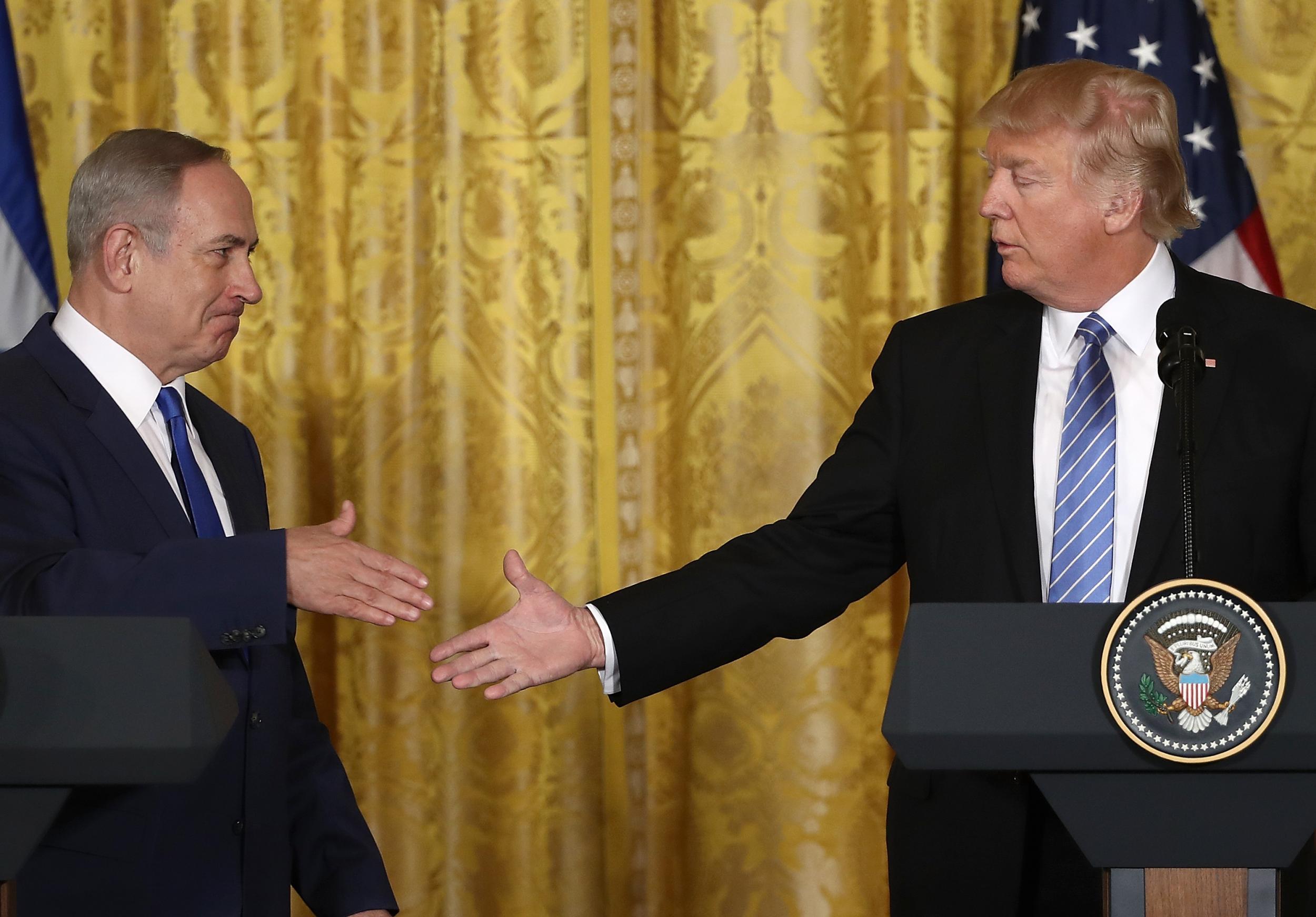Ex-Israeli spy chief says Donald Trump should have consulted intelligence chiefs before passing classified information to Russia
Reports come days before President's visit to Israel during first foreign tour

Your support helps us to tell the story
This election is still a dead heat, according to most polls. In a fight with such wafer-thin margins, we need reporters on the ground talking to the people Trump and Harris are courting. Your support allows us to keep sending journalists to the story.
The Independent is trusted by 27 million Americans from across the entire political spectrum every month. Unlike many other quality news outlets, we choose not to lock you out of our reporting and analysis with paywalls. But quality journalism must still be paid for.
Help us keep bring these critical stories to light. Your support makes all the difference.
The former head of Mossad’s intelligence directorate has expressed reservations about Donald Trump’s claim that he has the “absolute right” to share secret information with foreign officials.
Israel is believed to be the source of classified intelligence on Isis allegedly passed by the President to Russian foreign minister Sergey Lavrov and ambassador Sergey Kislyak in a closed-door meeting last week.
There are fears the reported disclosure of information gained under an intelligence sharing agreement could damage global security cooperation with the US.
Brigadier General Amnon Sofrin, a retired senior official in Israel’s foreign intelligence agency, said such agreements are subject to “unwritten rules” observed for decades.
“They say that you [the US] cannot make any use of sensitive information without any coordination or without asking my [Israel’s] permission,” he told journalists in a call organised by a pro-Israel advocacy group.
“For every use you want to make use of this information, firstly you have to ask my permission and second you have to take in consideration the sensitivity of the source.”
Brigadier General Sofrin said restrictions do not apply to heads of state, who have the “ability and mandate” to use classified information according to political considerations.
“But nevertheless the leader should ask his people about the sensitivity of the information, or consult at least with senior intelligence officers on its uses,” he added.
“We don’t know what was transferred between Mr Trump and Mr Lavrov…it may cause big problems for us because it can put sources at risk and damage our activities.”
Brigadier General Sofrin said any complaint by Mossad would normally be made directly to the CIA, to understand what information was passed over and try to mitigate any risks.
He does not believe the scandal will cause lasting damage to the “very intimate” security relationship between the US and Israel, adding: “None of us in the Israeli intelligence community like this event but I think it can be put aside and allow Mr Trump’s visit to be successful.”
The allegations broke just days before Mr Trump visits Israel during his first foreign tour, which has already been beset by disagreements over a planned trip to the Western Wall, which sits in occupied East Jerusalem.
Israeli’s ambassador to the US, Ron Dermer, said it has “full confidence in our intelligence sharing relationship with the United States”, while Israeli defence minister Avigdor Lieberman said a “deep, meaningful and unprecedented” security relationship would continue.

But the claims have sparked disquiet following a series of apparently contradictory statements from the White House and Mr Trump.
Hours after top officials claimed the original Washington Post report on disclosures was “false”, the President tweeted that he had the “absolute right” to share “facts pertaining to terrorism and airline flight safety” with Russia.
The information appears to be related to the basis for a ban imposed by the US and UK in March on laptops and tablets from being taken in hand luggage from 10 airports in Muslim-majority countries, which could be expanded to Europe.
Aides have maintained that no “inappropriate” information was shared but repeatedly failed to deny the intelligence passed on was classified.
HR McMaster, the national security adviser, claimed the real threat to national security was leakers "releasing information to the press."
In an off-camera briefing, White House press secretary Sean Spicer repeatedly refused to comment on specific allegations but at one point appeared to confirm intelligence was passed on.
When a journalist asked whether the US had reached out to the ally that provided the information, he replied: “I'm not going to comment on specifically where it came from.”
He added: “My understanding is the President, of course, has classification authority…so the President can always discuss common threats or common issues with other heads of government or other government officials as he deems appropriate to tackle the threats our country faces.”
The fact the information reportedly went to Russia during investigations into alleged links between Mr Trump’s campaign team and the Kremlin has generated alarm, as well as Moscow’s ties with Iran, China and the Syrian government.
Vladimir Putin told a press conference Mr Trump did not pass secrets to his foreign minister and claimed he was prepared to provide a transcript of talks to prove it.
The Russian President dismissed the scandal as a symptom of “political schizophrenia” in the US but did not elaborate on the source of transcript.
His announcement on Wednesday followed security fears over revelations American media were barred from the White House meeting but a photographer from a Russian state news agency was allowed inside after officials were apparently misled over his role.
Subscribe to Independent Premium to bookmark this article
Want to bookmark your favourite articles and stories to read or reference later? Start your Independent Premium subscription today.
Join our commenting forum
Join thought-provoking conversations, follow other Independent readers and see their replies
Comments